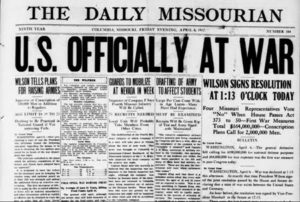This week a hundred years ago the United States declared war on Imperial Germany and entered the Great War (now known in America as World War I) on the side of the Allies, France, Britain, and Russia. (Russia was in the midst of revolution and about to drop out of the war.) Interestingly, the United States did not get around to declaring war on Germany’s chief ally, Austria-Hungary, until December 7, 1917.
The United States never declared war on the other two Central Powers, Ottoman Turkey and Bulgaria. No U.S. declaration of war on the Turks meant no participation in the Middle Eastern theatre of the war and, consequently, little or no American interest in or say as to what happened to the Middle East after World War I and the fall of the Ottoman Empire. That would be left to the French and the British. The resulting mess in the Middle East continues to this very day.
President Woodrow Wilson addressed a joint session of Congress on April 2, 1917, requesting that Congress declare war on Germany. Wilson cited the resumption of unrestricted submarine warfare by the Germans beginning on February 1, 1917 and Germany’s attempt to induce Mexico to attack the United States in return for the return of Texas, Arizona and New Mexico (the infamous Zimmerman Telegram). The Senate voted in favor of the joint war resolution on April 4, by a vote of 82 to 6. Two days later, April 6, the House followed, voting 373 to 50 to enter the war.
By that time, my great uncle, Francis Sulley, age 19 and hailing from West New York, New Jersey, had already spent more than two months as a prisoner of war of Imperial Germany, from January 1, 1917 until March 11, 1917. He was one of the “Yarrowdale men”, 72 American seamen serving among the crews of three British armed merchantmen sunk in the middle of the North Atlantic by a German surface raider, the SMS Möwe, in December 1916. These American seamen, along with hundreds of other seamen from both belligerent countries (Britain and France) and other neutral countries (e.g., Norway) taken from ships captured and sunk by the raider, were put aboard a captured British steamer – the SS Yarrowdale, on December 13, 1916. The Yarrowdale was then taken by a German prize crew to Germany, after running the British blockade and evading internment by Swedish authorities. The ship arrived in Swinemünde, Germany (now Świnoujście, Poland) on December 31, 1916.
The German government decided to treat the American seamen as a test case, detaining them as prisoners of war on the grounds that they had served and accepted pay on board enemy (British) armed merchantmen. When the U.S. Government discovered the situation by early February 1917, it demanded the immediate release of the Yarrowdale prisoners, pointing out that detaining neutral seamen as POWs violated international law. The Germans eventually decided to release the American seamen, and 59 of them, including my great uncle, were taken to the Swiss border on March 11, 2017. While in German POW camps, including the infamous camp at Brandenburg an der Havel, near Berlin, the Yarrowdalers – like all prisoners of the Kaiser – received starvation rations. The bread tasted like trees because it was made with flour mixed with sawdust. The cabbage soup was referred to by the Yarrowdale prisoners as “shadow soup” because – the prisoners claimed – it was made by hanging a cabbage over a vat of boiling water so that only its shadow fell on the water. The Americans lost an average of 30 to 40 pounds during their internment and looked emaciated upon their release.
While President Wilson did not mention the Yarrowdale prisoners in his April 2 message to Congress, the House of Representatives, in its report accompanying the joint war resolution, set forth their detention and ill treatment as one of the reasons for America’s entry into the war. H. Rep. No. 1, pp. 10-11, 65th Cong. 1st Sess. (April 4, 1917) (“Inhuman Treatment Accorded Yarrowdale Prisoners By German Authorities”). The House report stated in part that
Official reports now in the possession of the Department of State indicate that these American sailors were from the moment of their arrival in Germany, on January 3, subjected to the most cruel and heartless treatment. Although the weather was very cold they were given no suitable clothes, and many of them stood about for hours barefoot in the snow. The food supplied to them was utterly inadequate. After one cup of coffee in the morning almost the only article of food given was boiled frosted cabbage, with mush once a week and beans once a week. One member of the crew states that he was severely kicked in the abdomen by a German officer without provocation. He appears still to be suffering severely from this assault. . . .
All of the men stated that their treatment had been so inhuman that should a submarine be sighted in the course of their voyage home they would prefer to be drowned rather than have any further experience in German prison camps.
It is significant that the inhuman treatment accorded these American sailors occurred a month before the break in relations [, on February 3, 1917, when Wilson announced that the U.S. was breaking diplomatic relations with Germany over the resumption of unrestricted submarine warfare two days earlier,] and while Germany was on every occasion professing the most cordial friendliness for the United States.
Id.
